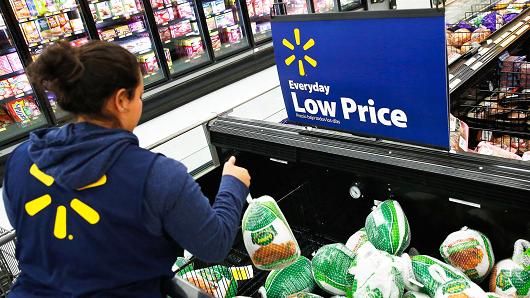Franchising, retail, business

14/10/2015
Wal-Mart shares had their worst day in 15 years Wednesday, after the world's largest retailer said sales will be flat in fiscal 2016, while its earnings will slide to between $4.40 and $4.70 a share — down from $4.84 last year.
Shares of competitors including Target, Macy's, Kohl's and J.C. Penney fell in sympathy, as Wal-Mart said it would invest billions into price over the next two years.
With Wal-Mart already undercutting much of its peers, the move will put added pressure on its competitive set, which is already struggling to grow sales against a backdrop of steep price cuts and rock-bottom starting prices.
Deflation in the retail sector was one reason why the National Retail Federation said that holiday sales will increase 3.7 percent this year, representing a deceleration from 2014.
Analysts and brands alike have said the holiday shopping season is already shaping up to be cutthroat, as retailers will do almost anything to get consumers to spend in their stores.
"It's a never-ending battle to capture their share of the overall spend," Steve Barr, U.S. retail and consumer leader at PricewaterhouseCoopers, said Tuesday.
It's easy to understand why Wal-Mart, once the undisputed leader in pricing, is putting such an emphasis on delivering the best value to shoppers. According to PwC's holiday forecast, 87 percent of shoppers said price is the primary driver behind their holiday spending choices.
This is even more pronounced among what the consulting firm has dubbed "survivalists," those who earn an annual income of less than $50,000. According to PwC, 90 percent of survivalists said price is the No. 1 factor behind their holiday purchase decisions.
Separately, a study released by coupon website RetailMeNot found consumers said a discount has to offer more than 34 percent off to be deemed a good deal.
"I think we'll see individuals taking advantage of the fact that prices haven't moved against them this year," the NRF's chief economist, Jack Kleinhenz, said on a call after the trade group's sales forecast.
Walmart U.S. chief Greg Foran declined to outline the categories in which it would invest in price, but said the company knows where the price gaps are. He and CEO Doug McMillon added there are some categories where it's important to compete on price — for example, consumer packaged goods brands that are sold elsewhere — and those where quality also plays a role, such as produce.
"We know it's part of our heritage," Foran said.
Also Wednesday, Wal-Mart told investors that its operating income is expected to be impacted by about $1.5 billion next year, mostly because of its decision to hike starting wages and provide better training for its workers. That would contribute to an earnings per share decline between 6 and 12 percent in the next fiscal year, CFO Charles Holley said.
That could have ripple effects across the industry, which has been under increasing pressure to raise wages in the wake of Wal-Mart's move.
The world's largest retailer also said that it expects sales to be flat during the current fiscal year, though excluding currency headwinds, they would be up 3 percent.
Although retail stocks tanked after Wal-Mart's announcement, Stifel Nicolaus analyst David Schick, who has a "hold" rating on the retailer, disagreed that it is a bad sign for retail overall.
"Sure, at the margin, Wal-Mart paying associates more and 'investing in price' won't help competitor margins, in our view," Schick wrote in a note to investors. "But we really think Wal-Mart should be seen as righting past wrongs [over-earning] or modernizing its business model over the next few years."
Cowen and Company analyst Oliver Chen, who has a "market perform" rating on Wal-Mart, likewise called attention to the ongoing improvement at its U.S. stores. In a research note, he said that management indicated positive traffic and comparable-store sales momentum should continue into next year.
By:http://www.cnbc.com/2015/10/14/wal-mart-just-raised-the-stakes-for-everybody-else.html